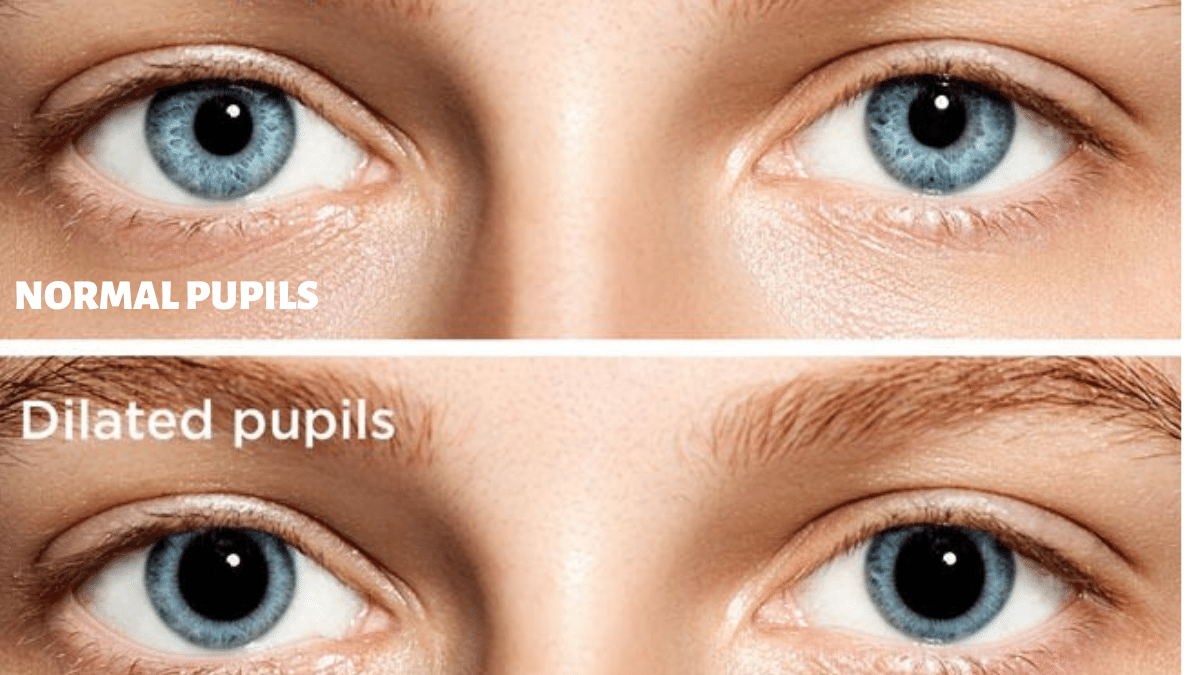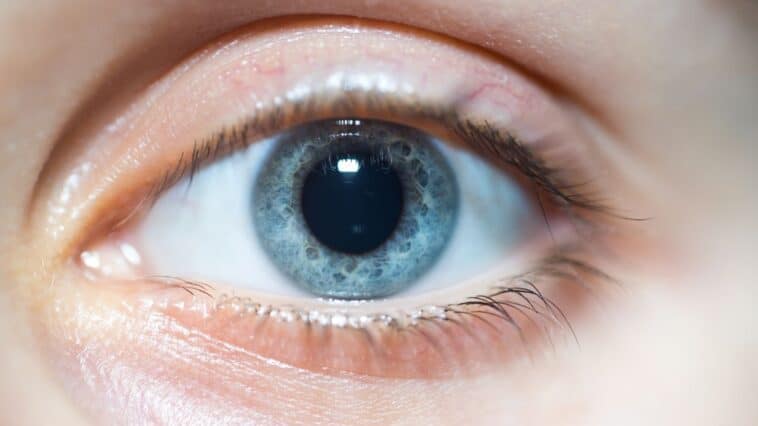What are Dilated Pupils?
When pupils are dilated, the black circular part in the center of the eye (pupil) increases in size. This can happen in response to various stimuli, such as bright light, increased arousal or stimulation, and certain drugs or medications.
Dilated pupils can indicate various benign and severe conditions, and an eye doctor should be consulted to determine the underlying cause. A doctor may also intentionally dilate the pupils for a medical examination.
What is Mydriasis?
Mydriasis is a medical term referring to the pupil’s dilation (widening). Various factors, including drugs, medical conditions, and exposure to bright light, can cause this condition. It can also be a normal response to certain stimuli, such as fear or excitement. When pupil dilation is excessive or uncontrolled, it can cause visual problems and other symptoms, and in such cases, it may indicate an underlying medical issue.

Causes of Dilated Pupils
Dilated pupils can be caused by various factors, including:
- Medications (such as anticholinergics, antihistamines, and opioids)
- Medical conditions (such as an eye injury, Horner’s syndrome, and Adie’s tonic pupil)
- Substance abuse (such as cocaine, ecstasy, and amphetamines)
- Emotional arousal (such as fear or excitement)
- Bright light exposure
- Increased intracranial pressure
- Neurological conditions (such as a brain tumor or stroke)
It is important to note that dilated pupils can also be a normal response in certain situations, such as in dim light conditions or after dilation drops are used during an eye exam. However, in some cases, dilated pupils indicate a severe underlying medical condition and should be evaluated by a healthcare professional.
What Conditions Cause Dilated Pupils?
Dilated pupils can be caused by various conditions, including:
- Neurological conditions such as head injury, brain tumor, or stroke
- Drugs such as anticholinergics, opioids, and stimulants
- Emotional arousal or response to light
- Eye conditions such as anisocoria, iritis, and lens displacement
- Medical conditions such as Horner’s syndrome, third nerve palsy, and Adie’s tonic pupil
It’s important to note that dilated pupils can also be a normal response to darkness. However, if you experience persistent or sudden dilated pupils, you should see a doctor to determine the underlying cause.
Do Dilated Pupils Hurt?
Dilated pupils are a physiological response that can occur due to various conditions, drugs, or stimuli, and the dilation itself is not painful. In general, dilated pupils do not cause pain. However, depending on the underlying cause of the dilated pupils, other symptoms such as headache, eye pain, blurred vision, and nausea may occur, which could cause discomfort. If you experience persistent or sudden dilated pupils and other symptoms, you should see an eye doctor for proper evaluation and treatment.
Symptoms of Dilated Pupils
Dilated pupils are a symptom themselves, but they can be accompanied by other symptoms depending on the underlying cause. Some of the common symptoms associated with dilated pupils include:
- Blurred vision
- Headache
- Nausea
- Light sensitivity
- Double vision
- Drooping eyelid
- Eye pain
- Difficulty focusing the eyes
- Reduced ability to accommodate (focus on close objects)
Not everyone with dilated pupils will experience all of these symptoms; some may be present due to other causes. If you are experiencing persistent or sudden dilated pupils, you should see a doctor for a proper evaluation and treatment.
Dilated Pupils Treatment
Treatment for dilated pupils depends on the underlying cause. Some common causes of dilated pupils include:
- Medications: Certain drugs, such as anticholinergics and sympathomimetics, can cause dilated pupils. Stopping the medication may resolve the issue.
- Neurological conditions: A brain tumor, traumatic brain injury, or Horner’s syndrome can cause dilated pupils. Treatment will depend on the underlying condition.
- Eye conditions: Some conditions, such as iritis or an anterior chamber depth problem, can cause dilated pupils. Treatment will depend on the specific eye condition.
- Trauma: Dilated pupils can result from physical injury to the head or eye. Treatment will depend on the extent of the injury.
Treatment will generally involve addressing the underlying cause, including medication, surgery, or other interventions. It is essential to consult a doctor for an accurate diagnosis and appropriate treatment plan.
How Long Will my Pupils be Dilated?
The duration of pupil dilation varies depending on the cause and the individual. In general, dilated pupils from pharmacological agents such as eye drops can last anywhere from 4 to 24 hours. Pupil dilation caused by traumatic injury or medical conditions may last longer. It is best to consult with a medical professional for a more accurate estimate for your specific case.
Can You Prevent Dilated Pupils?
Preventing dilated pupils is a complex issue, as dilation is often a natural response to stimuli such as changes in light or certain medications. However, some steps that can help include:
- Wearing sunglasses to reduce exposure to bright light.
- Avoiding certain medications known to cause dilation.
- Talking to a doctor or eye specialist for personalized advice.
Additionally, practicing good eye health habits, such as reducing screen time and regularly seeing an eye doctor for checkups, may help prevent dilated pupils.
Risks Associated With Dilated Pupil Procedures
There are several risks associated with procedures that cause dilation of the pupils, such as:
- Blurred vision: The pupils may remain dilated for several hours, causing blurred vision and sensitivity to light.
- Allergic reaction: Some people may experience an allergic reaction to the drops used to dilate the pupils, which can cause itching, redness, and swelling.
- Accommodative spasm: This is a temporary condition in which the muscles that control the size of the pupil go into spasm, causing the pupil to remain dilated and unable to adjust to changes in light.
- Increased intraocular pressure: The dilation of the pupils can increase the pressure inside the eye, which can be particularly dangerous for people with glaucoma.
- Eye injury: The dilation of the pupils can make the eyes more vulnerable to injury, such as from dust, wind, or other foreign objects.
Before undergoing the procedure, discussing the potential risks and benefits of dilating pupils with a doctor or eye specialist is essential.
When Should I See a Doctor About Dilated Pupils?
You should see a doctor about dilated pupils if you experience any of the following symptoms:
- Unequal pupil size: If one pupil is significantly larger than the other, it may indicate a problem with the eye or the nerve that controls the pupil.
- Sudden dilation: If your pupils suddenly become dilated, it can be a sign of a severe condition, such as a brain tumor, an aneurysm, or a stroke.
- Persistent dilation: If your pupils remain dilated for an extended period, it may indicate a problem with the eye or the nerve that controls the pupil.
- Pain or discomfort: If you experience pain or discomfort in the eye, it may be related to a problem with the pupil.
- Vision problems: If you experience blurred vision, double vision, or other vision problems, it may be related to a problem with the pupil.
See an eye specialist for a proper evaluation if you experience any of these symptoms. Early diagnosis and treatment can help prevent further problems.






